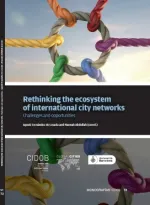Towards networked governance systems for development

For more than 400 years, nation-states have been the legitimate subject of global governance, with distinct achievements such as the United Nations or the European Union. Today, the increasing complexity of global challenges makes it impossible for national governments to address these issues alone. Today’s global governance arrangements need to favour flexibility over rigidity, consider voluntary measures over binding rules and privilege partnerships over individual actions. Considering real and perceived democracy deficits and the rapidly changing geopolitical context, it is an imperative for global governance arrangements to constantly adapt by readjusting strategies and approaches to solutions and develop new tools and measures to deal with issues.